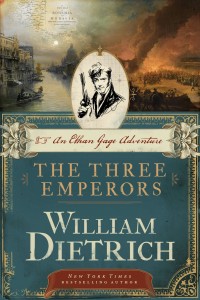The Three Emperors by William Dietrich
 By George Ebey
By George Ebey
In this seventh book in the acclaimed Ethan Gage adventure series, William Dietrich brings us the further exploits of Napoleonic adventurer Ethan Gage.
THE THREE EMPERORS finds our hero traveling to Venice, the battlefield of Austerlitz, and Prague in search of his wife Astiza and son Harry. The two have been taken prisoner by a secret society seeking the Brazen Head, a medieval machine capable of forecasting the future, and first described in the previous novel, THE BARBED CROWN. Rich with historical detail such as castles, and personalities such as Napoleon Bonaparte and Joachim Murat, the novel combines thrilling adventure with an authentic sense of time and place. Can the Gage family reunite and prevent terrible powers from falling into the wrong hands?
THE BIG THRILL recently checked in with William to learn more about Ethan Gage and what it takes to sustain a popular series over the long haul.
THE THREE EMPERORS is the seventh novel in the Ethan Gage series. Please tell us a little about the character and what the series is about?
Ethan is an American adventurer whose hunts for ancient relics play a role in the career of Napoleon and his wars. In addition to being a protégé of Benjamin Franklin, our hero is an electrician (an exotic occupation at the time), a gambler, trader, and a bit of a womanizer until he meets the woman who will become his wife. Unlike some deadly thriller heroes, Ethan has a wry, self-deprecating sense of humor and an opportunistic instinct for self-preservation. The books are funny, as well as exciting. The series begins in 1798 and follows Napoleon’s invasion of Egypt, and then goes chronologically through the period, taking our hero from the frontiers of America to Notre Dame. Using an American with no special rank allows me to give an outsider’s view of great events, battles, and historical personalities.
How did the Ethan Gage series get its start?
I’m a fan of dashing swashbuckler stories with a humorous touch, such as George MacDonald Fraser’s Flashman series about the British Empire or Richard Lester’s irreverent movie take on THE THREE MUSKETEERS back in the 1970s. I wanted an American character with a skeptical view of one of my favorite periods of history, the Napoleonic Wars. Ethan has the perspective I had as a journalist—that of perennial outsider. Readers enjoy him because he is imperfect—although always conscious of Franklin’s homilies—and determined to (someday) reform. He’s likeable because he’s so human.
What are some of the challenges involved in maintaining a series of this length?
A series character needs to evolve to sustain reader interest, but at the same time can’t achieve all his desires because then there is nothing more to write about. So maintaining narrative tension in book after book is a challenge, especially while trying to adhere to actual history. In the books, Ethan meets and marries Astiza, and they have a son, Harry. The lone wolf is the archetypical thriller hero, so the evolution from lone adventurer to family affair has also been a challenge. The books are narrated by Ethan, but in THE THREE EMPERORS Astiza and Harry are given chapters. The other challenge is coming up with new quests, new methods of escape, new perils, and so on. I’ve relied on history to give me ideas.
What are some of the rewards?
Creating appealing three-dimensional characters is not easy, so the series provides me with a bedrock voice—that of Ethan—which I’m comfortable with. As the series builds a core readership, its cumulative length gives me the opportunity to develop a lot of themes. The series also allows me to create an in-depth world of power, relationships, and strivings that hopefully becomes more convincing. The Game of Thrones series would be an example of that in the fantasy context.
What aspects of the late eighteenth and early nineteenth centuries are most attractive to you from a storytelling point of view?
This was the era that created the modern world: a time of political revolution, the beginnings of the scientific and industrial revolutions, and the period in which patterns of war and politics that we take for granted today were in fact created. So it is significant. It is also a time of life as grand opera—with glorious clothing, stately sailing ships, colorful armies, courageous charges, beautiful courtesans, greed, schemes, courage, and idealism. Time has made it easier to get a handle on the period’s great people, from Lord Nelson to Thomas Jefferson. As a novelist, I could never invent lives as interesting as those of these historical figures who had seventy or eighty years to live their own spectacular lives. It’s a very rich vein to mine, and Napoleon himself had a career of spectacular success and spectacular failure seldom equaled.
*****
 William Dietrich is the author of 17 books, 12 of them novels. His best-selling Ethan Gage series has sold into 28 languages and his nonfiction has won the Pacific Northwest Booksellers Award and his fiction has been a Booksense Pick. As a journalist at the Seattle Times, he shared a Pulitzer for coverage of the Exxon Valdez oil spill.
William Dietrich is the author of 17 books, 12 of them novels. His best-selling Ethan Gage series has sold into 28 languages and his nonfiction has won the Pacific Northwest Booksellers Award and his fiction has been a Booksense Pick. As a journalist at the Seattle Times, he shared a Pulitzer for coverage of the Exxon Valdez oil spill.
To learn more about William, please visit his website.
- Concrete Evidence by DiAnn Mills - September 30, 2022
- The Calculations of Rational Men by Daniel Godfrey - August 1, 2022
- Among The Innocent by Mary Alford - May 31, 2022
